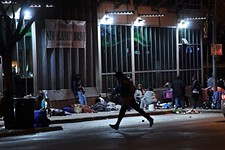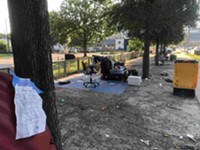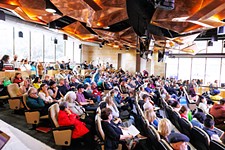Good Camp, Bad Camp: Council Mulls Sanctioned Sites for the Unsheltered
Helping end homelessness, or just managing public space?
By Austin Sanders, 10:30AM, Fri. Jan. 29, 2021
Thousands of Austin’s poor and vulnerable live in makeshift camps around the city, made legal in 2019 as the city rethought its approach to homelessness. The fallout from that controversial decision left its mark on last year's Council elections, and now City Hall is looking at public camping through a different lens.
In the months following Council’s June 2019 repeal of legal restrictions on sleeping, sitting and lying in public spaces, city staff was tasked with exploring the option of investing in sanctioned camps, anticipating that tents would pop up around town while the city and other agencies made slow progress creating more ways and places for people to be housed. Gov. Greg Abbott, after aiming to shame Council by ordering a sweep of encampments under highway bridges, opened a sanctioned camp on state-owned property in Southeast Austin; it’s still there, now known as Camp Esperanza.
The city’s homeless strategy team at the time recommended that Austin not follow the state’s lead. “Creating these environments may make it look and feel like the community is taking action to end homelessness on the surface,” they noted in a staff memo published in August 2019. “But, by themselves, they have little impact on reducing homelessness.”
Staff cited national research conducted by the U.S. Interagency Council on Homelessness and the U.S. Dept. of Housing and Urban Development to back up their conclusion. While sanctioned camps did get people off the streets - by concentrating and hiding their poverty in more remote locations - they were “costly in money, staff time, and effort,” “difficult to maintain,” and, although typically envisioned as temporary solutions (as was Camp Esperanza), they “prove difficult to close once they open.”
Eighteen months and an election later, Council Members Alison Alter, Paige Ellis, Pio Renteria and Kathie Tovo, as well as Mayor Steve Adler, have all expressed interest in revisiting sanctioned sites as a necessary prelude to reinstating camping restrictions elsewhere. “Nothing is off the table at present,” newly hired Homeless Strategy Officer Dianna Grey told Council earlier this week, “so long as we are holding to our values about respecting the rights of these [unsheltered] neighbors, and that our intent is to provide housing.”
Alter, acknowledging staff’s initial resistance, said “we are at a different point in time” with regard to unsheltered homelessness and that “it’s important to reassess.” She added that a designated camp could be a vacant lot with tiny homes, a Sprung shelter (basically an updated Quonset hut), or something else that’s not a tent city. Alter narrowly won a second term in last month’s run-off elections; former CM Jimmy Flannigan did not. In both contests in centrist West Austin districts, visible homelessness was a central issue that galvanized opposition to the incumbents.
But the long-term strategy adopted by the city when Matt Mollica was brought in to lead the Ending Community Homelessness Coalition in 2019 – funding lasting solutions, notably permanent supportive housing for those exiting homelessness who need ongoing services to stabilize their lives – has not changed. While Mollica is not opposed to better living conditions for people in camps, he believes pairing that goal with any effort to re-criminalize public camping is short-sighted. “Sanctioned campsites and banning camping is not a strategy to end homelessness; it is a way to manage public spaces,” Mollica told the Chronicle.
And managing public spaces is something Austin needs to do in addition to, not instead of, funding the housing and services ultimately needed by people on the street, Mollica said. “Ending homelessness takes righteous leadership around that goal, not policy decisions that sway [with] public opinion. Ending homelessness is not a political movement; it can’t be rested in politics. It’s not something we’re going to do in two years, and switching strategies too early can disrupt planning and funding streams.”
Adler does see a political component to reducing homelessness, including responding to the concerns of housed neighbors about the conditions at encampments. However, the mayor told us on Monday, Jan. 25, returning to the pre-2019 status quo, with public camping being banned and criminalized, was the “worst possible thing we could do.”
“I still feel confident that the action we took [in 2019] was the right action for us to take,” Adler said. “If you're trying to change something that's been institutionalized, you have to be disruptive.” But, he added, “the sheer number of people that we have now camping… has its impact on the management of public spaces. I think it's reasonable for people to stand up and say, ‘Let's do a better job of that.’ But that doesn't mean we're retreating at all.”
To dispense with euphemism, “managing public space” means removing the unsightly conditions that arise at encampments that lack adequate services. Trash piles up at camps because it’s not collected as often as the waste produced by housed residents. People meet bodily needs outside because they are denied access to most private bathrooms and have few public options to use. Needles are found at camps because Texas does not allow for safe, supervised injection sites for those with substance use disorders, whether or not they have shelter.
Steven Potter, an advocate who serves on Austin’s Homelessness Advisory Council and has lived on the street (he currently has a room at a ProLodge, told us that partially reinstating the camping ban – even after sheltering people in camps – could cause problems. “A partial ban in some parts of town but not in others would create a lot of confusion and uncertainty among unsheltered people,” Potter told us.
He also noted that Council may be underestimating the amount of pushback they will receive from neighborhoods if a camping area is designated near their homes. “With sanctioned camps or PSH, the question becomes where are they going to go? I know ahead of time, wherever they decided to put these, there’s going to be NIMBYism challenging the projects.”
Got something to say on the subject? Send a letter to the editor.
A note to readers: Bold and uncensored, The Austin Chronicle has been Austin’s independent news source for over 40 years, expressing the community’s political and environmental concerns and supporting its active cultural scene. Now more than ever, we need your support to continue supplying Austin with independent, free press. If real news is important to you, please consider making a donation of $5, $10 or whatever you can afford, to help keep our journalism on stands.
Austin Sanders, July 15, 2022
Austin Sanders, June 17, 2021
April 19, 2024
April 19, 2024
homelessness, sanctioned camps, public camping, camping ban, Dianna Grey, homeless strategy officer, Alison Alter, Steve Adler, Matt Mollica, End Community Homelessness Coalition, ECHO, Steven Potter











